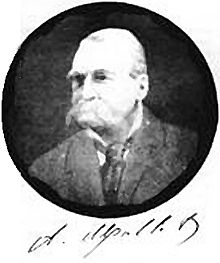Anatole Mallet

Jules Theodore Anatole Mallet[1] (23 May 1837 – 10 October 1919) was a Swiss mechanical engineer, who was the inventor of the first successful compound system for a railway steam locomotive, patented in 1874.[2] He is known for having invented three important forms of compound locomotive.
In 1876 he introduced a series of small two-cylinder compound 0-4-2T tank locomotives for the Bayonne-Anglet-Biarritz Railway in France.[3]
He subsequently designed an articulated compound system with a rigid chassis at the rear carrying two high-pressure cylinders, and two low-pressure ones mounted on a swivelling front truck. This was patented in 1884[2] with full rights granted in 1885.[4] This was first used for a series of 600 mm (1 ft 11+5⁄8 in) narrow gauge locomotives specially built by the Decauville Company in 1888 for the Paris Exposition of 1889.[4] This arrangement became known as the Mallet locomotive. The final developments of these in the USA were some of the largest steam locomotives ever built.
A third compound locomotive, less well-known, was a tandem compound developed in 1890 for SACM as a collaboration with Alfred de Glehn and the Russian A. Borodine.[5] The high and low pressure cylinders were mounted on a common axis, with the high pressure ahead. Unlike the US tandem compounds, the high and low pressure cylinders were cross-connected between sides, which also required them to be receiver compounds with an intermediate reservoir as a pair of curved pipes passing through the smokebox. Large numbers of these, mostly a 2-8-0 derivative, were built for Russian and Hungarian railways making them the most-produced type of tandem compound locomotive. Z. Kordina's design for Hungarian State Railways was a similar 4-4-0, although outside-framed and with the low-pressure cylinders ahead of the high pressure.[5]
He was awarded the Elliott Cresson Medal of The Franklin Institute in 1908.
-
Early Mallet 2-cylinder compound locomotive working the Bayonne-Anglet-Biarritz (B.A.B.) Railway
-
SCB Ed 2x2/2, a typical normal-gauge compound Mallet tank. Note the larger diameter of the low-pressure front cylinders.
-
One of the last US large compound Mallets
-
Mallet tandem compound, Russian locomotives class П
See also
References
- ^ "Google Patents". patents.google.com. Retrieved 2022-09-12.
- ^ a b Ransome-Wallis, P. (1959). Illustrated Encyclopedia of World Railway Locomotives (2001 republication ed.). Dover Publications, Inc. pp. 500–501. ISBN 0-486-41247-4.
- ^ Van Riemsdijk 1994, pp. 10–11.
- ^ a b Durrant, A. E. (1974). The Mallet Locomotive. Newton Abbot: David & Charles. ISBN 0-7153-5904-5.
- ^ a b Van Riemsdijk 1994, pp. 37–38.
- Van Riemsdijk, J.T. (1994). Compound Locomotives: An International Survey. Penryn: Atlantic Transport Publishers. ISBN 0-906899-61-3.


![SCB Ed 2x2/2 [de], a typical normal-gauge compound Mallet tank. Note the larger diameter of the low-pressure front cylinders.](http://upload.wikimedia.org/wikipedia/commons/thumb/6/68/7695Ed2x22SBBCFFFFSi.jpg/120px-7695Ed2x22SBBCFFFFSi.jpg)

![Mallet tandem compound, Russian locomotives class П [ru]](http://upload.wikimedia.org/wikipedia/commons/thumb/4/49/%D0%9F%D0%B0%D1%80%D0%BE%D0%B2%D0%BE%D0%B7_%D0%9F%D0%BF.jpg/120px-%D0%9F%D0%B0%D1%80%D0%BE%D0%B2%D0%BE%D0%B7_%D0%9F%D0%BF.jpg)